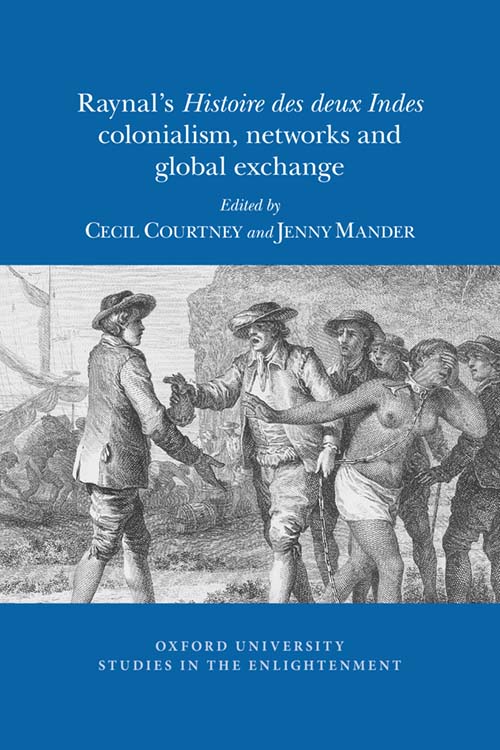Accueil > Actualités ultramarines > Vient de paraître Raynal’s ’Histoire des deux Indes’ : colonialism, (...)
Vient de paraître Raynal’s ’Histoire des deux Indes’ : colonialism, networks and global exchange sous la direction de Cecil P. Courtney et Jenny Mander à la Voltaire Foundation
Le 14 octobre 2015 à 22h29
Vient de paraître Raynal’s ’Histoire des deux Indes’ : colonialism, networks and global exchange sous la direction de Cecil P.
"Histoire des deux Indes, was arguably the first major example of a world history, exploring the ramifications of European colonialism from a global perspective. Frequently reprinted and translated into many languages, its readers included statesmen, historians, philosophers and writers throughout Europe and North America. Underpinning the encyclopedic scope of the work was an extensive transnational network of correspondents and informants assiduously cultivated by Raynal to obtain the latest expert knowledge. How these networks shaped Raynal’s writing and what they reveal about eighteenth-century intellectual sociability, trade and global interaction is the driving theme of this current volume.
From text-based analyses of the anthropology that structures Raynal’s history of human society to articles that examine new archival material relating to his use of written and oral sources, contributors to this book explore among other topics :
• how the Histoire created a forum for intellectual interaction and collaboration ;
• how Raynal created and manipulated his own image as a friend to humanity as a promotional strategy ;
• Raynal’s intellectual debts to contemporary economic theorists ;
• the transnational associations of booksellers involved in marketing the Histoire ;
• the Histoire’s reception across Europe and North America and its long-lasting influence on colonial historiography and political debate well into the nineteenth century."
Table des matières

Collaborator list : Antonella Alimento, University of Pisa ; Gilles Bancarel, Société d’Étude Guillaume-Thomas Raynal, Béziers ; Philippe Barthelet ; Muriel Collart, Société wallonne d’étude du 18e siècle (SWEDHS) ; Cecil Courtney, Christ’s College, University of Cambridge ; Christian Donath, American University in Cairo ; Daniel Droixhe, University of Liège ; Georges Dulac, CNRS, Montpellier ; Gianluigi Goggi, University of Pisa ; Daniel Gordon, University of Massachusetts ; Susanne Greilich, University of Regensburg ; Ursula Gonthier, University of Birmingham ; Peter Jimack, University of Stirling ; Hans-Jürgen Lüsebrink, Universität des Saarlandes ; Jenny Mander, Newnham College, University of Cambridge ; Kenta Ohji, Kyoto University ; Ida Pugliese, National University of Ireland, Galway (NUIG) ; Stéphane Pujol, Université de Paris Ouest Nanterre La Défense ; Reinier Salverda, University College, London and Fryske Akademy, Leeuwarden ; Fredrik Thomasson, Uppsala University ; Sylvana Tomaselli, St John’s College Cambridge ; Jennifer Tsien, University of Virginia.
Collaborator biographies :
Cecil
Jenny


